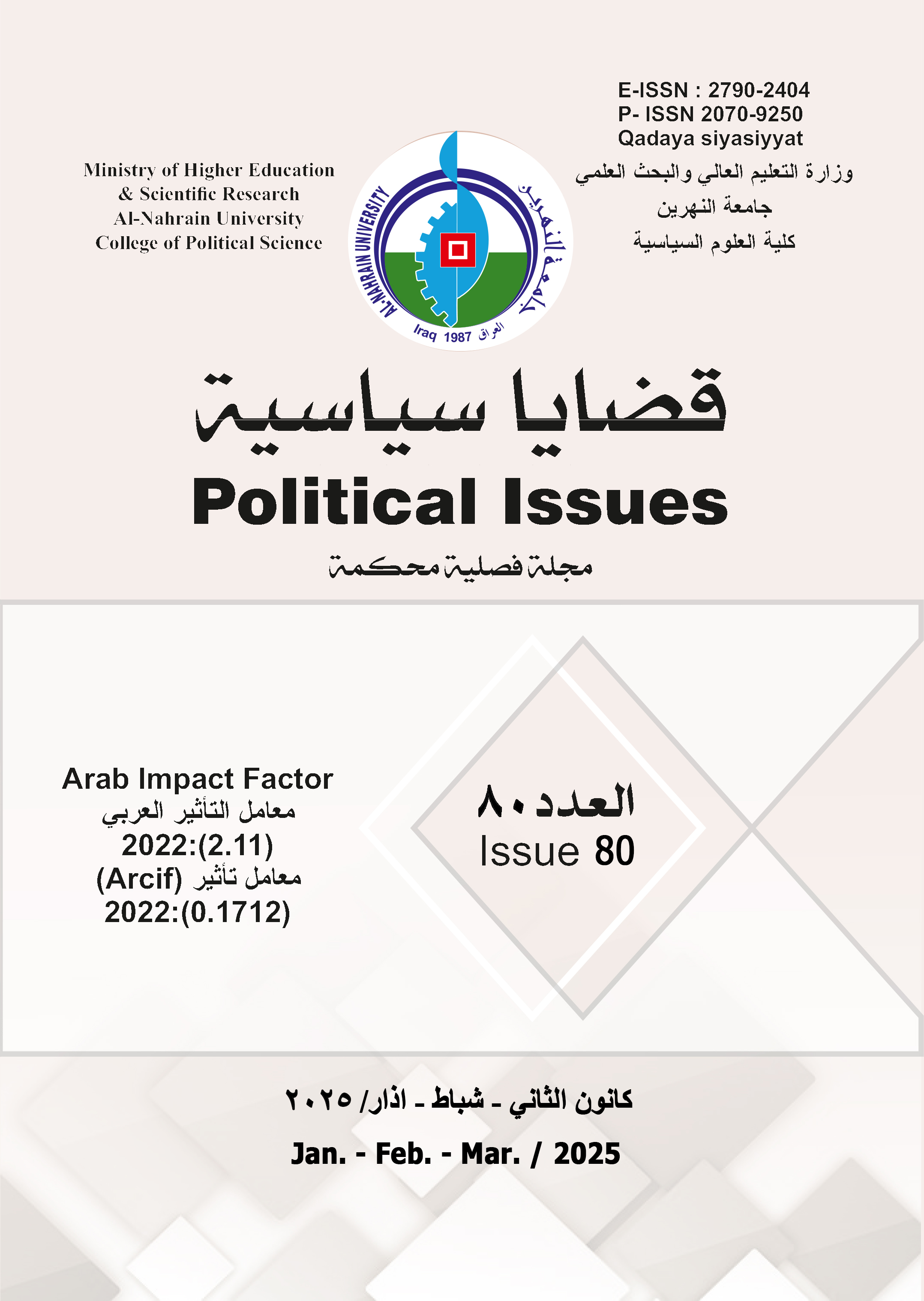Cyber warfare and its impact on international relations: The Zionist entity’s war on Hezbollah as a model
DOI:
https://doi.org/10.58298/802025701Keywords:
Cyber warfare , soft power , international relationsAbstract
Cyber ??warfare is one of the most important wars used in international relations. Its use has developed as a result of the tremendous progress in information and communications technology. This war has gradually become a substitute for traditional warfare. In this study, which is one of the modern studies on cyber warfare, its research problem was defined as the impact of the use of cyber warfare on international relations, using the Israeli cyber war on Hezbollah as a model for that war. This study used the descriptive approach in its research methodology in addition to the power approach in international relations. The study was based on one hypothesis that says: Cyber ??warfare does not have a significant impact on international relations. The study proved the invalidity of this hypothesis, as cyber warfare is of great importance in influencing international relations and even an introduction to comprehensive military wars after its use. The study reached a number of results, the most important of which was that most countries in the world realize the importance of developing modern strategies for wars that subjugate opponents with low material and human costs. It is also impossible to dispense with military force (hard) after using cyber warfare, as hard warfare follows it. This was clear and evident when Israel launched Its cyber attacks on Hezbollah as a prelude to launching a comprehensive military war on the party. The study also concluded that it is important to benefit from technological progress in building modern armies, including cyber power.
References
Amal Saad Gharib, Hezbollah: Religion and Politics, (Beirut: Center of Civilization for the Development of Islamic Thought), second edition 2009).
• Cybersecurity (Kingdom of Saudi Arabia: General Authority for Small and Medium Enterprises (Monsha’at) 2022).
• Ihab Khalifa, Post-Information Society: The Impact of the Fourth Industrial Revolution on National Security (Al-Mustaqbal for Advanced Research and Studies (UAE), Cairo: Al-Arabi Publishing, first edition 2019).
• Taha Hamid Hassan Al-Anbaky, Narjis Hussein Zayer Al-Aqabi, Principles of Scientific Research in Political Science (Baghdad: Dar Oma, Rabat: Dar Al-Aman, Algeria: Ikhtilaf Publications, Beirut: Dafaf Publications, first edition 1436 AH 2015 AD).
• Abdullah Al-Baridi, Secrets of Social Engineering: Towards Inventing New Tools to Increase Our Collective Intelligence (Riyadh: Kitab Al-Arabiya 11, first edition 1432 AH 2011 AD).
• Obaid Asaad Saad Al-Din, Artificial Intelligence (Amman: Dar Al-Ibdaya Publishers and Distributors, first edition 2012-1433 AH).
• Balbal Ibtisam, The Value of Cybersecurity in Russian Foreign Policy Orientations Towards the African Region, Master's Thesis (Algeria: University of Mohamed Bouguerra-Boumerdes-Faculty of Law and Political Science, Department of Political Science, 2019-2020).
• Saleh Haider Abdel Wahid, Cyber Wars; A Study of Their Concept, Characteristics and Ways to Confront Them, Master's Thesis, (Amman: Middle East University, Faculty of Arts and Sciences, Department of Political Science, July 2021).
• Mina Boutata, Cyber Wars in International Relations: Concept and Phenomenon, Master's Thesis, (Algeria: University of August 20, 1955 Skikda, Faculty of Law and Political Science, 1442-1443 AH 2021-2022 AD)
• "The Israeli Aggression on Lebanon after Targeting the Central Command Headquarters of Hezbollah and Assassinating its Secretary-General" Situation Assessment Series (Doha: Arab Center for Research and Policy Studies, Political Studies Unit, Situation Assessment September 29, 2024).
• A. Ben Khalifa Noufel, Algerian Sports Journalists' Attitudes towards the Use of Electronic Journalism: A Field Study on a Sample of Sports Journalists, Journal of Media Studies (Berlin: Arab Democratic Center, Issue Ten, February 2020).
• Ahmed bin Ali Al-Maimouni, The Active Front: Implications of the Cyber Confrontation between Iran and Israel, Journal of Iranian Studies (International Institute for Iranian Studies (Rasanah), Fourth Year, Twelfth Issue, October 2020). • Ahmed Arabi Faddam, "The Role of the United Nations in Combating Cyber Terrorism" Coordination Magazine (Volume (36) Issue (5) on 30 December 2022 AD 1444 AH.
• Ahmed Mohie Mohammed Ahmed Ali, "The Impact of the Israeli-Iranian Cyber War on Arab Regional Security" Journal of the Higher Institute for Qualitative Studies (Volume 3 Issue 8 July (2023).
• Political Horizons (Arab Center for Research and Studies, Issue 59, July 2020).
• Afnan Darwazeh, The Degree of Use of the Internet by Students of Educational Sciences Mechanism at An-Najah National University, An-Najah University Journal for Research (Humanities) (Palestine, Volume 23 (3) 2009).
• Enaam Abdul-Ridha Sultan Al-Akabi, "Employing Cyber Wars in Developing the Concept of Power for Major Powers" Political Issues Magazine, (University of Nahrain: College of Political Science, Issue 73, April-May-June 2023).
• Tawfiq Dhabah, Media Treatment of Environmental Issues Through the Media New: A descriptive and analytical study of the National Waste Agency’s Facebook page as a model, Journal of Media Studies (Berlin: Arab Democratic Center, Issue 10, February 2020). • Gil Baram, Kevin Lim, Presentation: Mervat Zakaria, “Cyberwar and the Future of the Iranian-Israeli Conflict”
• Hamed Mohammed Ali Al-Baldawi, Confronting Cyber Warfare in the Rules of International Humanitarian Law, Journal of the Iraqi University (Issue 57, Vol. 2, 2022 AD, 1444 AH).
• Hussam Abdul Amir Khalaf, and Wahj Ali Hamza, "The Concept of Cyber Security and Its Relationship to Artificial Intelligence", Journal of Anbar University for Legal and Political Sciences, Issue (2) Volume (13) December (2023).
• Hassan Saad Abdul Hamid, Engineering the Mind: A Study of Methods of Deceiving Public Opinion (Iraq: National Security Council, Al-Nahrain Center for Strategic Studies, Karas Al-Nahrain Issue (20) 1441 AH 2020).
• Hassoun Aboud Hajij, and Safaa Kazim Ghazi, "The Effects of the Crime of Electronic Piracy", Al-Qadisiyah Journal of Law and Political Science (University of Al-Qadisiyah (Iraq) Issue Two, Volume Seven December 2016).
• Hanan Abbas Salman, and Ibtisam Kazem Jassim, “Cyber Power and Its Impact on Economic Power - China as a Model,” Journal of the Kufa Studies Center, (University of Kufa, Issue (70), Part One, September 2023). • Salem Nasreen, The Impact of Employing Artificial Intelligence Technologies in the Military: A Study of the Variables of Wars and Conflicts, A Study of the Journal of Law and Interdisciplinary Sciences (Algeria: University of Ziane Achour-Djelfa-(Issue (1) 2024).
• Salem Saeed Al-Kindi Halima Suleiman Al-Balushi, "Awareness of the Culture of Social Engineering among Students of Technical Education Colleges in the Sultanate of Oman: A Case Study of Students of the Technical College in Al-Musannah", Sultan Qaboos University Journal of Arts and Social Sciences
• Abdullah Saleh Al-Najjar, The Reality of Using the Internet in Scientific Research among Faculty Members at King Faisal University, Journal of the Center for Educational Research (Qatar University, Tenth Year, Nineteenth Issue, January 2001).
• Alaa El-Din Farhat, Cyber Warfare and the Future of Global Security, Al-Naqid Journal of Political Studies, (Volume 6) Issue 2 (2022).
• Imad Khalil Ibrahim, and Najwan Hani Mahmoud, "The Use of Cyber Power in the Policies of Major Powers" The Iraqi Journal of Political Science (Fifth Year, Issue (10) March 2024).
• Understanding the Rise of the Party God, the Lebanese, the conflict of the security zone in southern Lebanon (1985-2000 AD), Masarat Magazine (Saudi Arabia, Issue 23, Jumada al-Ula 1437 AH, February 2016).
• Fawaz Abdulrahman Ali Doda: “Cybersecurity in the Republic of Yemen,” Manarat al-Amn Magazine (Sana’a: Police Academy, Volume (1), Issue 11, January-June 2024).
• Majdi al-Dagher, “Elite trends towards employing security media for artificial intelligence applications in combating cybercrimes and its implications for supporting and enhancing cybersecurity in Egypt: A field study,” Arab Journal of Media and Communication Research (Issue 33, April-June 2021). • Muhammad Hassan Saeed Daraji, and Omar Saleh Al-Akkour, “Cyberattacks according to the provisions of international humanitarian law,” Studies: Sharia and Legal Studies (Volume 51, Issue 1, 2024).
• Marwa Hamed Al-Badri, The Struggle between Iran, Syria and Hezbollah and its Effects on the Lebanese State, Arab Policies Magazine (Doha: Arab Center for Studies, Issue 5, November 2019).
• Manar Mohsen Abdul-Ghani, and Muammar Khaled Abdul-Hamid, “Legal Confrontation of Internet Crimes between the Principle of Legitimacy and the Shortcomings of Legislation and the Role of the Judiciary in Addressing It,” Journal of the Iraqi University, Issue 39/2, December 31, 2017).
• Nabhan Zambour Al-Saadi, “Geopolitics of Cyber Risks of Cyberspace on the National Security of the Arab Mashreq Countries,” Journal of the Babylon Center for Human Studies (Volume 14, Issue 2, 2024).
Additional Files
Published
Issue
Section
License
Copyright (c) 2025 سعود محمد الشاوش

This work is licensed under a Creative Commons Attribution 4.0 International License.
This is an Open Access article distributed under the terms of the creative commons attribution (CC BY) 4.0 international license which permits unrestricted use, distribution, and reproduction in any medium or format, and to alter, transform, or build upon the material, including for commercial use, providing the original author is credited.






